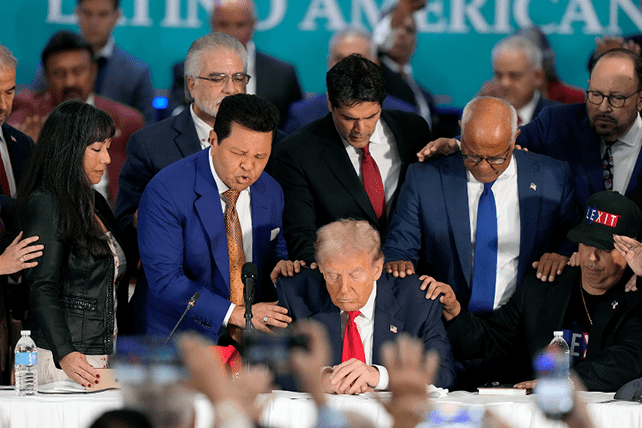(RNS) — As the 2024 presidential contest enters its final days, former President Donald Trump is turning to the group most responsible for getting him this far: evangelical Christians.
“I’m here tonight to deliver a simple message to Christians across America: It’s time to stand up and save your country,” Trump told a group of pastors in Concord, North Carolina, on Monday evening (Oct. 21). He then implored his religious supporters to flood the polls on Election Day, saying, “On Nov. 5, Christian voters need to turn out in the largest numbers ever.”
It was part of the former president’s closing pitch to his most loyal religious supporters, coming amid a string of faith-themed events across multiple states scheduled for the waning days of his campaign. Trump has made similar arguments in the past, but his God-talk has taken on new forms this year, particularly in the wake of the assassination attempt on his life in July. While the former president’s backpedaling on abortion has frustrated some of his religious supporters, prompting questions of turnout, evangelicals who advise Trump are adamant he will not only retain his long-standing support among their group, but also surprise Democrats by making gains among Hispanic evangelicals as well.
The string of faith-leaning events is something of a pivot for Trump this election. While he has engaged with religion this campaign season — he has sat in for calls with evangelical leaders, for example, and made headlines for promoting a “God Bless the USA Bible” with the tagline “we must make America pray again” — election-watchers have tracked fewer splashy appeals to evangelicals than in past years.
But on Monday, Trump and his allies outlined an argument to evangelicals that mixed policy with God-and-country rhetoric. Before he took the stage in North Carolina on Monday, the former president’s son Eric Trump warmed up the crowd with a fiery speech that implied his father was chosen by God.
“It is so clear to me, more so than ever before, that (Trump) was put here for this mission: to save this country,” the younger Trump said, referring to how his father survived a shooting. “We need God in our life. We need God in society. We need children to respect God. We need God in our schools. And if Kamala Harris won’t say it, I will: We love God and we will always be a nation of faith.”
He was followed by the Rev. Franklin Graham, son of famed evangelist Billy Graham and a longtime supporter of Trump, who led a prayer that implored the Almighty to secure Trump’s victory, saying, “We pray for our nation, and Father if it be thy will that President Trump will win this election.”
Former Secretary of Housing and Urban Development Ben Carson, who serves as the Trump campaign’s “National Faith Chairman,” and former Trump administration official Peter Navarro, who was imprisoned earlier this year on a contempt-of-Congress conviction, also spoke. But it was Trump’s roughly hourlong address featuring a slate of faith-themed proposals that appeared to energize the crowd of pastors.
After insisting his opponent, Vice President Kamala Harris, would “come after Christians all over the country,” Trump promised to create a federal task force to fight “anti-Christian bias,” allow homeschool parents to spend $10,000 a year tax-free on costs associated with their children’s education, ban schools from “promoting critical race theory or transgender gender ideology” and “reaffirm that God created two genders: male and female.”
The proposals were light on details, and the Trump campaign did not respond to requests for clarification, instead sending along a statement by Carson insisting Trump “did more for the faith community than any president in history.” But Trump’s proposals drew praise from attendees such as the Rev. Tony Suarez, vice president of the National Hispanic Christian Leadership Conference, who has served as one of Trump’s evangelical advisers since 2016. Suarez said “every issue” Trump mentioned resonated with pastors in attendance, who he said flew in from different parts of the country to attend.
“We’re seeing enthusiasm not just from leaders, but from the congregants of those leaders,” he said.
Suarez added: “It already feels like a victory rally.”

